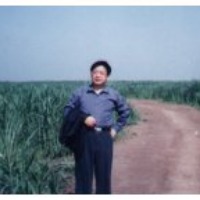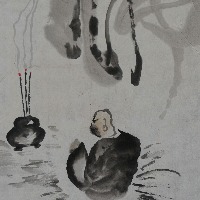(Johnson Country Community College, U.S.A)
Understanding the Aesthetic of the “Trivial”: The Great Music of Dao in the Subtle Melody of Function Words
Shudong Chen
(Johnson Country Community College, U.S.A)Between William James, the eminent American pragmatist philosopher of the nineteenth century, and Liu Dakui (刘大櫆), the famous Chinese essayist of the Qing dynasty, there should not have been any conceivable connection. Their works however do reveal something particularly compatible and invaluable especially regarding what I call“an aesthetic of the trivial” . From utterly different cultural backgrounds, they both notice the indispensable but often overlooked role of function word (功能词) or “xuci”(虚词), which influences reading and writing in ways beyond our usual consciousness.The paper thus suggests how to read and re-read the familiar texts with a special attention to the often“invisible” but indispensable role of function word especially with regard to the cases of parallelism in the prosodically “pragmatic” ways that both James and Liu indicate along with the contemporary Chinese linguists, such as Feng Shengli(冯胜利). With references to the classical Chinese texts and some additional examples from Geoffrey Chaucer, Joseph Conrad, Henry James, Guy de Maupassant, Charles Baudelaire, Johann Wolfgang von Goethe and the compatible cases in classical and modern Japanese, the paper argues that the function word, other than their usual grammatical function, also creates the vital narrative impact, such as setting up the live syntactic-prosodic verbal environment, and thus indicates not only a crucially “local” but also “global” phenomenon yet to be further understood.
prosody; rhetoric; comparative literature; translation; function word
1. Introduction: Serendipitously Ubiquitous Dao of the Trivial
Daois in “the shit and piss” (道在屎溺), which meansdaois everywhere even in the least noticeable place. To catchdaoin the texts, it should therefore probably start with the least noticeable whether we identifydaowith “qi” in terms of Tongcheng Pai (桐城派)’s “因声求气”(understandingqithrough sound) or with “yi” according to Lu Zongda (陆宗达)’s “因声求义” (understanding meaning through sound).Either way, first and foremost, we go with the least noticeable prosodically, that is, the sound of “trivial” function word. This is perhaps why both William James and Liu Dakui emphasize the importance of function words. For James, to acquire “immediate feeling” or our direct experience with the true rhythms of life, we should take these little things, such as “the conjunctions” as seriously “as primordial elements of ‘fact’ ... the distinctions and disjunctions” . He explains how and why we should pay attention to things that appear as trivial or insignificant as “prepositions, copulas, and conjunctions, ‘is’ ‘isn’t’ ‘then’‘before’ ‘in’ ‘on’ ‘beside’ ‘between’ ‘next’ ‘like’ ‘unlike’ ‘as’ ‘but’” . It is because these function words “compenetrate harmoniously” to make it possible for us to understand how life may “f ow out of the stream of pure experience, the stream of concretes or the sensational stream, as naturally as nouns and adjectives do, and ... melt into it again as fluidly when we apply [the function words] to a new portion of the stream”. Even though what James emphasizes may not be exactly the importance of sound but the syntactic and psychological significance of the function words, Liu, however, specifically refers to the importance of sounds or rhythms as one of the crucial roles of the function words in “Essay of Occasion”(论文偶记).Regardless of its characteristic beauty of simplicity, classic writings before Confucius’ times, argues Liu, do not appear as much expressive as those of Confucius’ times. It is because, other than content words, emphasizes Liu, there are simply not enough function words for people to use then(上古文字初开,实字多,虚字少……至孔子之时,虚字详备,作者神态毕出……文必虚字备而后神态出,何可节损?)So when Confucius writes, he has enough function words to make his expression as vivid as he wants. This is why, as Liu further emphasizes, when one writes, there must be enough function words at one’s disposal to bring out he otherwise unutterable spirit or “qi” of composition, which is, as Liu sees it, only alive in the “rhythm” of the words as what is truly essential to writing. Imagine what would happen “should not there be enough ‘xuci’ for us to use?” This is exactly the rhetorical question that Liu makes us think. Indeed, without enough function words at our disposal to create the meaning-making, “qi” -making,dao-making, worldmaking, and even human-becoming rhythms of composition, it would be therefore impossible to depict something as unutterable and intangible as thedao-like meaning,qi, or the subtly profound emotion the way that Zhuangzi and Sima Qian(司马迁,ca. 145 or 135 B.C. — 86 B.C.) masterfully demonstrate in the eponymous book and inShiji《史记》respectively.
2. Function Words in Chinese Classics
As in everyday life, a possible way to understand the value of an otherwise barely noticeable string is to see whether or how it makes an exquisite necklace by piecing together the otherwise scattered pieces of pearl. Similarly, to examine the crucial role of function word is to see how it functions in the “verbal context”especially in the form of parallelism, which is so widely used particularly in classic Chinese literature not only as expected in “fu” 赋 or “pian wen” 骈文 but also in “gu wen” 古文 for clear verbal imagery as well as subtle rhythm that enhances expression, even though the latter, represented by prominent writers, such as Han Yu (韩愈,768 —824), is famous as a critical response topian wenregarding its pervasive interest in parallelism. Regardless, even in Han Yu’s exemplary essays ofguwen, such as “Yuan Dao” (原道), parallelism is extensively used to such a degree that it would appear utterly impossible for the author to appear so persuasive without parallelism being so used.古之时,人之害多矣。有圣人者立,然后教之以相生相养之道。为之君,为之师。驱其虫蛇禽兽,而处之中土。寒然后为之衣,饥然后为之食。木处而颠,土处而病也,然后为之宫室。为之工以赡其器用,为之贾以通其有无,为之医药以济其夭死,为之葬埋祭祀以长其恩爱,为之礼以次其先后,为之乐以宣其湮郁。为之政以率其怠倦,为之刑以锄其强梗。相欺也,为之符、玺、斗斛、权衡以信之。相夺也,为之城郭甲兵以守之。害至而为之备,患生而为之防。今其言曰:“圣人不死,大盗不止。剖斗折衡,而民不争。”呜呼!其亦不思而已矣。如古之无圣人,人之类灭久矣。何也?无羽毛鳞介以居寒热也,无爪牙以争食也。In ancient time, not until the appearance ofShengren(sages), humans were under constant threats of immense dangers. It wasShengrenwho taught people how to survive in ways humanly possible; it wasShengrenwho at once governed and educated people; it wasShengrenwho taught them how to make it a homeland of the central plain cleared of wild animals and insects; it wasShengrenwho showed people how to cover themselves with clothes against cold weather; it wasShengrenwho taught people how to secure food from land; it was alsoShengrenwho had people moved from unsafe forests and damp caves and sheltered them in the houses; it was they who made tools that people needed for manufacturing; it was they who advocated trade to let goods be available wherever wanting; it was they who developed medicine to care the sick and the dying; he formulated burial ceremony to cultivate love; he designed rituals to maintain order; it was they who used legal penalty to curb aggressive behavior. To prevent cheating, it was also Shengrenwho standardized systems of measurement; to prevent invasion, it was also they who had the cities well walled and guarded. For whatever might happen, it was they who were always fully prepared. Now listen to what someone still claims, “As long as there areShengren, there would be endless robbery; as long as we do not abandon system of measurement, people would never stop fighting.” How could anyone still say anything such as this? Has he ever used his head? Had not been forShengren, there would have been no human race a long, long time ago. Why? It is because neither did we have feathers or furs to fend themselves against harsh weathers, nor did we have teeth and claws sharp enough to fight for food against the wild beasts.In the powerful “weizhi” 为之 structure, which sustains the famous piece with its enduring power of persuasive parallelism, the pronoun “zhi” (之)may not be literally stressed as a rule, but, as a marker, it is where a pause should occur to pave the way like a stepping stone for the next word to be stressed.In this way, the function word “zhi” truly mediates for the metrical pattern of parallelism to function in ways so delicately enlivened with the essay’s overall rhythmical structure and beauty.In this way, the “weizhi” structure functions like an all-too-ordinary and thus invisible string that makes a perfect necklace out of the scattered pieces of pearl; it adjusts, coordinates, and enriches the rhythmic impact of the parallelism.Thus, with “wei” (为), in the “weizhi” (为之)structure to be slightly stressed to make “zhi” an unstressed pause for the following verbs, such as “shi”(食 eating) orgong(工 manufacturing) to be stressed, the rhythm of the narrative in the form of parallelism is set. The “weizhi” structure works particularly well at the very beginning alternating with the phrase “ranhou” 然后 (then, thereafter, or therefore). Similarly,zhiin the sentences of “如古之无圣人,人之类灭久矣”(Had not been for “Shengren”圣人, there would have been no human race a long, long time ago) may seem quite redundant since the meaning of the sentences could remain quite intact even without the function word, but the sentences without it may sound flat or some what awkward; the sentences, in other words, would in no way sound equally rhythmical and powerful without thezhi, which apparently mediates the sentences for the rhythmical pauses and enhances the expression of the meaning with emphatic rhythms otherwise impossible.But ultimately, regardless of whether or how each “zhi” should be actually stressed or not, especially with regard to what each “zhi” stands for in the text, an issue that certainly justifies further exploration, the very structure of “weizhi”, very much like “it was ... who ...” of the English version, is clearly set up to give the text the indispensable and emphatic rhythmic coherence through the repeated and rhythmically punctuated pauses; the“weizhi” phrases thus piece together or tighten up, even in ways so synaesthetically like a string of sound, the otherwise seemingly scattered sounds of words.Indeed, in Chinese, regardless of what says in theory, the important rhythmmediating and -making pause or stress, as Zhu Guangqian (朱光潜,1897—1986)points out, often occurs with function word, as is the case with Chen Zi’ang (陈子昂,c. 661—702)’s “念天地之悠悠, 独怅然而涕下”。The same is with Tao Hongjing (陶弘景,456—536)’s “山中何所有?岭上多白云。只可自怡悦,不堪持赠君”。In Xue Daoheng (薛道衡,540—609)’s “人日思归” (Thoughts of Home), the function words also suggest and mediate the meaningful pauses in “入春才七日,离家已二年。人归落雁后,思发在花前”。The function word “when”(he ceng何 曾) likewise marks and takes the key position to be stressed in Song Huizong (宋徽宗,1082—1135)’s 燕山亭 (Yanshan Ting), “这双燕何曾,会人言语”。So is the case in modern Chinese “门外 —坐着— 一个穿破衣裳的老年人” (“Outside the door sits an old man in rags”). The wordbei被 in Su Dongpo(苏东坡,1037—1101)’s “Shui Long Yin” (水龙吟) is another such a case. “梦随风万里,寻郎去处,又还被,莺呼起”。In all these cases what becomes further clearer is the enormous rigidity and f exibility of function word that regulates the sentences and adjusts itself for the desirable visual and sound impact; function word enjoys its prosodically significant flexibility and adaptability particularly in poetry. This is why, with reference to the rich cases on function words, especially on 而 (er), 焉 (yan), and 之 (zhi) among many others, Qian Zhongshu comes to emphasize, once again, how “poetry [needs] function word ... whether in terms of The Book of Poetry《诗经》andLi Sao《离骚》since Zhou and Qin’s era or the tetrasyllabic poems, pentasyllabic long narrative poems, heptasyllabic poems, or mixed syllabic poems since Han and Wei period” because “function word appears so indispensable in adding the rhythmic beauty to almost all these poems”(诗用虚字……盖周秦之诗骚,汉魏以来之杂体歌行……或四言,或五言记事长篇,或七言,或长短句皆往往使语助以添迤逦之概).Actually, as Feng Shengli has been demonstrated as one of the most crucial focal topics in almost all his major works, stress is an issue so vital for any fruitful prosodic theories; it is an issue, in other words, needs to be suff ciently “regulated”in order for its generally describableusage to be thoroughly understood or clearly explainable at least in theory. Stress, however, as Feng also so insightfully“stressed,” is very much like air, which is neither “visible” nor “touchable,” but undoubtedly “real”. As a result, how to stress or where to stress, for Feng, varies as subtly as air. With this self-conscious “amendment,” Feng emerges a “radical”empiricist in ways very much as William James does from among the rank of“traditional” rationalists or “ordinary” empiricists, who, as James emphasizes, often tend to dismiss, each in his own ways, the live and vital on-the-spot elements as “trivial” or “insubstantial” for the sake of theoretical consistency or static accountability; “life” , as James puts it, “is confused and superabundant, and what [we now] appear to crave is more of the temperament of life in its philosophy, even though it were at some cost of logical rigor and formal purity”. These so easily dismissible “trivial” and often rather “messy” elements, such as function words, as James so stresses, are in reality so crucial for the actual understanding or pragmatic grasp of how language really works like the “invisible” but “indispensable” and ubiquitous” air. As if quite coincidently, stress, for Zhu Guangqian, is also a matter ofpersonaldecision or a business of “improvisation” in accordance with pure cont/textual verbal relations in addition to the general rules. As related to the issue of stress, here is also the problem of pause. Even though every culture has its own explicable general rules on how to make rhythm whether in terms of “foot”“cesura” or “dou” (读) or “dun” (顿) there are however theoretically inf nite ways for “improvisation” on subtle variation as in music, especially in jazz. How each word should be stressed and how long one needs to pause from one word to another, all depend on one’s own understanding, which is inf nitely variable from person to person. With this in mind, the problem regarding where or when pause and stress occur or concur could be as much an issue of art as it is a matter of science. Pause and stress could indeed be of different categories, but their rhythmical concurrence may not be so unlikely as with 之 and 而 in 念天地之悠悠,独怆然而涕下.
3. Function Words: The Cases in Non-Chinese Classics
Thus, whether or how a function word is actually stressed, unstressed, or slightly stressed, the indispensable pause, so prosodically crucial, is often such a pragmatic occurrence especially when it is mediated, marked, or facilitated by the function word.Again, quite serendipitously, as Zhu already suggested, this is not just something of a local phenomenon but rather a global one, especially regarding the importance parallelism and the indispensable role of function words in making parallelism.The function wordslaandde, for instance, as Zhu points out, suggest pauses in the line from Alfred de Vigny (1797—1863)’s “La maison du berger” “J’aime/la majesté/de la souffrance/humaine” (I love the majesty of human suffering). Similarly, in the following sentence from Maupassant’s novelMont-Oriolas a part of depiction of Marquis of Ravenel, father of Christiane Andermatt, the main character, the function words “pour” and “des”, whether to be slightly stressed or not, clearly indicate a crucial rhythmic pauses in the ref ned parallelismTant?t ... Il se passionnait pour l’égalité des hommes; pour les idées modernes; pour les revendications des pauvres; des écrasés; des souffrants.


 The Great Clod belches out breath and its name is wind. So long as it doesn’t come forth, nothing happens. But when it does, then ten thousand hollows begin crying wildly. Can’t you hear the, long drawn out? In the mountain forests that lash and sway, there are huge trees a hundred spans around with hollows and openings like noses, like mouths, like ears, like jugs, like cups, like mortars, like rifts, like ruts. They roar like waves, whistle like arrows, screech, gasp, cry, wail, moan, and howl, those in the lead callingyeee, those behind calling outyuuu! In a gentle breeze, they answer faintly, but in a full gale the chorus is gigantic. And when the fierce wind has passed on, then all the hollows are empty again, Have you never seen the tossing and trembling that goes on?
The Great Clod belches out breath and its name is wind. So long as it doesn’t come forth, nothing happens. But when it does, then ten thousand hollows begin crying wildly. Can’t you hear the, long drawn out? In the mountain forests that lash and sway, there are huge trees a hundred spans around with hollows and openings like noses, like mouths, like ears, like jugs, like cups, like mortars, like rifts, like ruts. They roar like waves, whistle like arrows, screech, gasp, cry, wail, moan, and howl, those in the lead callingyeee, those behind calling outyuuu! In a gentle breeze, they answer faintly, but in a full gale the chorus is gigantic. And when the fierce wind has passed on, then all the hollows are empty again, Have you never seen the tossing and trembling that goes on? There are numerous examples regarding not only how the regular position of function word can be altered or adjusted for the sake of sound but also how f exible the function word, such asxi, can really be used in so doing, at least in six possible ways,according to Zhu. As with the case of “不我信(伸)兮” that Qigong refers to regarding how the function word “xi”兮, which is usually not to be stressed becomes instead stressed when it is put at the end position of a sentence, that is, the most stressed position in the whole sentence, so is兮used in the lines of Qu Yuan (屈原,ca. 340 B.C.—ca. 278 B.C.)’sLi Sao① for the prosodically stressed pause, i.e., “惟草木之零落兮,恐美人之迟暮” which expresses the poet’s concern that his life may end too soon like the withering f owers and quickly faded beauty prior to his dreamed accomplishments. ② The same function word “xi”, however, is then used to separate what is normally inseparable as verb and object for the desired rhythms in “穆将愉兮上皇”(to please in earnest the higher authorities) and “盖将把兮琼芳” (to present fragrant f owers) from “Dong Huang Tai Yi” ofJiu Ge《九歌·东皇太一》and “旦余济兮江湘” (at dawn I cross the rivers of Yangtze and Xiang) from “She Jiang” ofJiu Zhang《九章·涉江》。③ Then “xi” is used as a preposition “yu” 于, which separates the verb and the object while mediating the whole sentence for the coherence of rhythmic pattern in these lines, such as “悲莫悲兮生别离” (nothing is sadder than to part while alive) from “Shao Si Ming” of Jiu Ge《九歌·少司命》, “搴芙蓉兮木末” (to seize the f owers of lotus by ends) from “Xiang Jun” ofJiu Ge《九歌·湘君》 and “遗余珮兮澧浦” (to leave girdle ornaments in the River Li) from Qu Yuan’sLi Sao. ④“Xi” is used to mediate a pause between adverb and verb as in “时不可兮骤得” (time is not easy to hold) from “Xiang Fu Ren” ofJiu Ge《九歌·湘夫人》 and “荃独易兮为民正” (to hold justice alone to all) from “Shao Si Ming” ofJiu Ge. ⑤ So does “xi” separates the main parts from the complements in the complementary sentences in “今湘沅兮无波” (now calmly f ow the rivers of Xiang and Yuan) from “Xiang Fu Ren” ofJiu Ge, “望夫君兮未来” (to wait for you yet to come) from “Xiang Jun” ofJiu Geand“子慕予兮善窈窕” (I am so taken by your grace and beauty) from “Shan Gui” of Jiu Ge《九歌·山鬼》。⑥ “Xi” is here used as “zhi” 之 in these lines fromJiu Ge, such as “采芳洲兮杜若” (to pick yabumyoga on the island of fragrance) of “Xiang Jun”, “抚长剑兮玉珥” (to touch gently the jade earrings on the long sword) from“Dong Huang Ta Yi”, and “望涔阳兮极浦” (to hold Cen Yang’s river in view from distance) of “Xiang Jun”.Indeed, the irreplaceable theme-enlivening role of function word inherent in the syntactic-prosodic pattern could be traced back toYijingwhen presence of function words in the texts is still much less than common. But this less than common presence of function word in the text does not diminish its importance; rather it indicates its indispensability because the text would not function without a few most commonly used ones inYijing, such as 其“qi” (the, this, its, his, their, your, etc.) and 之“zhi” (it, this).The presence of the underlined function words in the following hexagram text inYijing, as I have also argued elsewhere, for instance, is so crucial in making this piece quintessentially “poetic” to rival anyone from Shijing.鸣鹤在阴, There is a crane calling on the shady northern slope
There are numerous examples regarding not only how the regular position of function word can be altered or adjusted for the sake of sound but also how f exible the function word, such asxi, can really be used in so doing, at least in six possible ways,according to Zhu. As with the case of “不我信(伸)兮” that Qigong refers to regarding how the function word “xi”兮, which is usually not to be stressed becomes instead stressed when it is put at the end position of a sentence, that is, the most stressed position in the whole sentence, so is兮used in the lines of Qu Yuan (屈原,ca. 340 B.C.—ca. 278 B.C.)’sLi Sao① for the prosodically stressed pause, i.e., “惟草木之零落兮,恐美人之迟暮” which expresses the poet’s concern that his life may end too soon like the withering f owers and quickly faded beauty prior to his dreamed accomplishments. ② The same function word “xi”, however, is then used to separate what is normally inseparable as verb and object for the desired rhythms in “穆将愉兮上皇”(to please in earnest the higher authorities) and “盖将把兮琼芳” (to present fragrant f owers) from “Dong Huang Tai Yi” ofJiu Ge《九歌·东皇太一》and “旦余济兮江湘” (at dawn I cross the rivers of Yangtze and Xiang) from “She Jiang” ofJiu Zhang《九章·涉江》。③ Then “xi” is used as a preposition “yu” 于, which separates the verb and the object while mediating the whole sentence for the coherence of rhythmic pattern in these lines, such as “悲莫悲兮生别离” (nothing is sadder than to part while alive) from “Shao Si Ming” of Jiu Ge《九歌·少司命》, “搴芙蓉兮木末” (to seize the f owers of lotus by ends) from “Xiang Jun” ofJiu Ge《九歌·湘君》 and “遗余珮兮澧浦” (to leave girdle ornaments in the River Li) from Qu Yuan’sLi Sao. ④“Xi” is used to mediate a pause between adverb and verb as in “时不可兮骤得” (time is not easy to hold) from “Xiang Fu Ren” ofJiu Ge《九歌·湘夫人》 and “荃独易兮为民正” (to hold justice alone to all) from “Shao Si Ming” ofJiu Ge. ⑤ So does “xi” separates the main parts from the complements in the complementary sentences in “今湘沅兮无波” (now calmly f ow the rivers of Xiang and Yuan) from “Xiang Fu Ren” ofJiu Ge, “望夫君兮未来” (to wait for you yet to come) from “Xiang Jun” ofJiu Geand“子慕予兮善窈窕” (I am so taken by your grace and beauty) from “Shan Gui” of Jiu Ge《九歌·山鬼》。⑥ “Xi” is here used as “zhi” 之 in these lines fromJiu Ge, such as “采芳洲兮杜若” (to pick yabumyoga on the island of fragrance) of “Xiang Jun”, “抚长剑兮玉珥” (to touch gently the jade earrings on the long sword) from“Dong Huang Ta Yi”, and “望涔阳兮极浦” (to hold Cen Yang’s river in view from distance) of “Xiang Jun”.Indeed, the irreplaceable theme-enlivening role of function word inherent in the syntactic-prosodic pattern could be traced back toYijingwhen presence of function words in the texts is still much less than common. But this less than common presence of function word in the text does not diminish its importance; rather it indicates its indispensability because the text would not function without a few most commonly used ones inYijing, such as 其“qi” (the, this, its, his, their, your, etc.) and 之“zhi” (it, this).The presence of the underlined function words in the following hexagram text inYijing, as I have also argued elsewhere, for instance, is so crucial in making this piece quintessentially “poetic” to rival anyone from Shijing.鸣鹤在阴, There is a crane calling on the shady northern slope

















